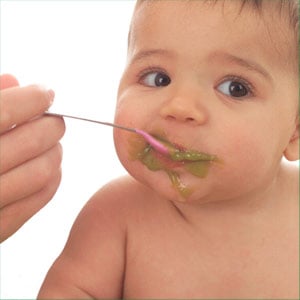There comes a time when it will no longer be appropriate to feed the baby with mushy food. This is when solids are included in the diet. The leap to solid foods can be both dramatic and effective in terms of helping the baby to grow.
People that are experienced in baby nutrition know about the full benefits of making the right transitional moves. They also understand that the baby will probably require a period of adjustment before they are prepared to take solid foods on a regular basis.
The parent will need to watch out for the so called baby milestones. They occur between five months and eight months after birth.
They are the clues that will help the parent to deal with all the requirements of the child as well as to understand the right time to introduce solids into the diet as would be expected in the normal circumstances.

The parent should look out for clues that the baby is well developed enough to take solids on a regular basis. The people that understand baby nutrition care will know when the time is right.
However some people will need guidance especially if they are relatively inexperienced in child rearing. The signs will be there and they should be picked up or else the growth of the baby might be held back for a while. It is also important to watch out for the dangers of constipation if the child is not ready.
The introduction of solid foods is a gradual process that is always tested back and forth to see whether the child is coping well with the requirements. In some ways it is the beginning of their work in terms of development and other aspects.
Being persistence in the introduction of solids
The process of baby nutrition requires that the parent is persistent in their attempts to get the child to eat solids. However this does not mean that the child is pressed to take up foods that they are not ready for.
Often the work is done on a feeding schedule which determines the periods at which different foods are introduced into the diet.
There should also be a mechanism for recording the response of the child to see whether they actually reject the food or not. Breast milk is the starting point but it is certainly not the end point. At about six months there is a need to think about table foods. Some children will even start earlier at about four months.
There is a need to maintain formula feed as part of the baby nutrition care program. This practically means that the baby will have alternatives if they do not like a specific type of food that the parent is preparing for them. The parent has to think about the possibilities of teaching the child healthy feeding habits.
It is said that many of the bad habits that people develop start at this point in their lives. They will learn to skip breakfast and to hog food when they get the chance. They might even develop a taste for junk food.
The initial dietary plan
There are a series of first foods that are used for the babies in all the different contexts. The paediatricians might advise that it is probably better for the parents to wait for about six months before they start the child on solid foods while others are content with four months.
After six months then the waiting period goes beyond the norm for baby nutrition. The baby will give some indications as to the time when they are ready to take on these foods.
The breast milk formula will be the starting point at about 32 ounces a day. The baby may also begin to hold the head well thus indicating that they are going through their normal developmental process with great speed.
They will also be able to sit without too much support. That is a time when there is an interest in solid food. The tongue thrust stage is what is known as the idea time to start on solids.
The initial attempts should be made in the times when they are really happy before they take on the feeding session.
This will make them associate the solid foods with happy memories. That makes for a great beginning in terms of the way that they handle the different elements of the feeding program. It is best to go for the second feeding of the day in order to give the baby the best chance to adjust to the baby nutrition care.
To begin with the baby should be given a tablespoon of cereal with about five tablespoons of natural milk from the breast. It will take time for the baby to get used to the texture and it might all dribble down in the first instance.
When the baby becomes more used to the regime then they should get another iron fortified cereal such as barley. Pureed fruits are also a good idea. This will then progress to vegetables and meat products. The parent should be way of allergies at this point because they will become manifest in due course.
At about seven to nine months, the baby will be taking less formula at about twenty four to thirty two ounces a day.
There will also be a process of honing the pincer to grasp certain soft foods. Green beans are really advanced in terms of texture and taste. Vegetables should come before fruits. Solid foods should be offered twice daily with about four tablespoons with each meal.
The baby will begin to self regulate and indicate when they are full up. The use of bananas and avocado will be a great help to build the nutrients that are essential for baby nutrition. At about 9 months certain brands such as Cheerios might become appropriate.
This will then lead to thicker textures including tofu. It is best to stick with the small portions in order to avoid choking.
At ten months the baby will be able to go for about twenty four ounces of breast milk and formula on a daily basis. The everyday food will join the menu including pasta and egg yolks. The meat can be shredded for better texture.
Fish must be limited to twelve ounces per week in order to avoid mercury exposure. Pasteurized cheese might also be added to the mix for better balance.
Things to look out for at the late stage
The parent needs to keep away from the full fat cow milk in the preliminary year due to the difficulties with the digestive system.
Cheese and yoghurt are actually easier to digest because they have been through a culturing process. The honey is at risk of causing botulism and food poisoning. Citrus fruits might also not be appropriate. Butter and egg whites should be avoided including shellfish.
As a tip the baby should be strapped to a chair when feeding in order to avoid choking. The rudiments of baby nutrition care require proper attention to the safety of the child.
In many ways this is a learning experience for both the parent and the child. They should embrace it in that spirit. They also have to be prepared for all the work that is required to keep up the good work with the projects. In due course it will all pay off.
The child will get the care they need and the parent will be able to deal with their growth baby nutrition responsibilities. The process of growing up will take the strain on both the parents and children.
It also means that they have to ensure that they are dealing with every single element of the program with due diligence. Children are very responsive to the moves by the parent to assist them in their growth. It is also the best way of dealing with their nutritional requirements.
As the child grows they will develop their own tastes for the things that they enjoy. They will also be able to make decisions on the way that they handle their dietary requirements.
The progress to the solid foods is never easy and therefore the baby has to be supported all the way. They also have to get the best sort of guidance so that they do not choke on the food.
Responsible parenthood requires that the mum or dad goes out of their way to introduce the baby to the food that will be part of its environment. They also have to ensure that the baby is well looked after.
The configurations with the baby feeding have to concentrate on the things that matter. They have to give the baby the very best choices.
At its best baby nutrition is all about finding the personality of the baby and making it work in all circumstances. It is also about finding the right balanced diet for the baby. That is the best way of giving the baby a good start in life.
Wrapping up
In conclusion, the journey of introducing solids to your baby can be both exciting and daunting. It is important to remember that babies need time to adjust to new food and may not be ready to try everything right away.
Feeding your baby solids should be a gradual process that you take your time with and make sure you are following the recommended guidelines for introducing solids. With patience and understanding, your baby can become a healthy and happy eater.



